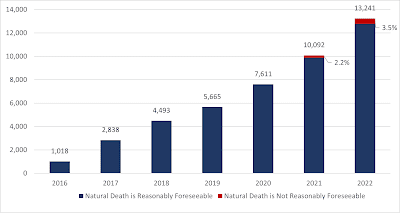This message was released by Dr Gordon Macdonald, the CEO of the Care Not Killing Alliance.
Media Release October 31
“Providing high quality palliative care and supporting people at the end... is what we would urge the members of the House of Keys focus on and pull back from this dangerous and ideological policy.”Members of the Isle of Man's House of Keys today voted to grant Dr. Alex Allinson's Assisted Dying Bill a second reading. The bill still faces many legislative hurdles:
"Once the House has resolved that a Bill be read a second time, at least one subsequent sitting must pass before consideration of the Bill's clauses may take place. This stage requires the Member in charge of the Bill to move that each clause stand part of the Bill. It gives Members the opportunity to debate each clause, to seek an explanation from the sponsor of the Bill as to the effect of particular clauses, and to move amendments."MHKs will vote next week on whether:
"The Clauses of the Assisted Dying Bill 2023 be referred to a Committee of five Members to consider and report by the end of February 2024.
 |
| Dr. Gordon Macdonald |
"It is disappointing that given the chilling stories coming out of Canada, representatives in the House of Keys have decided to take another step towards legalising euthanasia.
"As we see in a small number of places that have removed long term universal protections, by allowing the deliberate ending of human life with death row drugs, many vulnerable people will feel pressured into ending their lives. This is exactly what we see in Canada, which introduced euthanasia in 2016, where thousands who are killed annually cite fear of being a burden or loneliness as a reason.
"There are other problems too. As we see in the Netherlands and Belgium limits on who qualifies for a lethal injection have been swept away. No longer is state aided killing limited to those with less than six months to live, but routinely includes disabled people, those with chronic non-terminal conditions and individuals with mental health problems, such as patients with dementia, treatable depression, anorexia even a victim of sexual abuse.
"And then there is the worrying data from the US and Europe that shows legalising euthanasia and assisted suicide, far from reducing the number of suicides seems to be associated with an increase in the numbers taking their own lives in the general population, perhaps because it normalises the idea lives not worth living."
Dr Macdonald concluded: "While killing is cheap, providing high quality palliative care and supporting people at the end is not, but this is what we would urge the members of the House of Keys focus on and pull back from this dangerous and ideological policy."
More information on the Isle of Man euthanasia bill:
- Isle of Man parliament to vote on assisted suicide bill (Link).




















